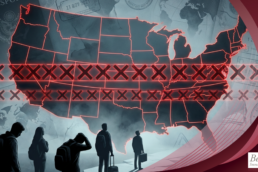The Department of Homeland Security (DHS) has unveiled a major proposed rule that could significantly change how international students, exchange visitors, and foreign media professionals are admitted into the United States.
For decades, many F-1 students, J-1 exchange visitors, and I-visa media representatives were admitted under a system known as “Duration of Status” (D/S). This flexible policy allowed individuals to stay in the U.S. as long as they maintained their program or employment, without any fixed end date on their entry record.
Now, DHS is proposing to totally eliminate this system in favor of fixed admission periods, which would align these categories with almost every other U.S. visa.
What the Proposed Rule Would Do
Here are the key changes DHS is seeking to implement:
- End of Duration of Status (D/S): Students, exchange visitors, and media workers would no longer have open-ended stays tied to their programs. Every visa for these categories would now have a hard-and-fast end date.
- Fixed Admission Periods:
- F-1 and J-1 visas – Valid through the program end date (as listed on Form I-20 or DS-2019), but capped at four years maximum. Students would then have a 60-day (F-1) or 30-day (J-1) grace period to depart from the U.S.
- I-visas (foreign media) – Admission would be limited to 240 days, with just 90 days for Chinese nationals working as journalists. These media representatives would then have to immediately leave the U.S.
- Extensions Required: If a program runs longer than the initial admission period, individuals would need to file a formal Extension of Stay (EOS) with USCIS. This is a major change from the current practice of simply updating information with a school official or program sponsor.
- Increased Oversight: DHS argues that the new proposal will enhance national security, improve compliance monitoring with visa appointees, and reduce the risk of unauthorized overstays.
Why This End to Duration of Status Matters
This proposal represents a dramatic shift in U.S. immigration policy for students and visitors. For institutions like the University at Buffalo, Canisius College, and Buffalo State, which host thousands of foreign students each year, this change could create new administrative hurdles and uncertainty.
Students pursuing degrees that typically last longer than four years, such as Ph.D. programs, could face mid-program interruptions if their extensions are delayed. Universities and employers may also face added paperwork and compliance burdens.
Most significantly, the proposal introduces new risks for students and visitors:
- More costs: Students and exchange visitors will face new expenses, including government filing fees and potential legal fees, each time they need to apply for an extension of stay.
- Processing delays: Because USCIS is already dealing with heavy caseloads and backlogs, extension applications could take months to process, leaving students waiting in uncertainty.
- Potential gaps in status: If an extension is not approved before the current admission period expires, students risk falling out of lawful status, which can jeopardize their ability to continue studying or working in the United States.
A Local Immigration Perspective
Rosanna Berardi, Esq., Managing Partner of Berardi Immigration Law, offered this insight:
“This is a serious departure from how international students and exchange visitors have historically been treated. While DHS may see it as a way to tighten oversight, the reality is that it creates more uncertainty for students, universities, and employers. In a border region like Western New York, where thousands of Canadian and international students cross daily, the ripple effects could be immediate.”
Timeline and Next Steps
- Publication Date: The proposed rule is scheduled to be published in the Federal Register on August 28, 2025.
- Public Comment Period: There will be a 30-day window for the public to submit comments, with a longer period (60 days) for the proposed paperwork requirements.
- Final Rule: After reviewing comments, DHS may finalize the rule, potentially in the coming months.
Until the rule is finalized, the current Duration of Status (D/S) system remains in place.
Frequently Asked Duration of Status Questions
- Does this mean students and exchange visitors will have to leave the U.S. after four years, no matter what?
Not necessarily. Students can apply for an Extension of Stay with USCIS if their program runs longer than the four-year cap. However, this adds costs and the risk of delays. - How does this affect Canadian students crossing the border daily for school?
Canadian students on F-1 visas would also be subject to the four-year maximum. Many in Western New York could need extensions mid-program, depending on their degree length. - When will this change take effect?
This is still a proposed rule. It will not take effect until DHS finalizes it after the public comment period. That process could take several months.
What This Means for You
If you are a student, exchange visitor, or employer sponsoring individuals in these categories, now is the time to prepare for change. Institutions should assess how this rule could impact their international student populations, while individuals should plan for the possibility of filing extensions with USCIS in the future.
At Berardi Immigration Law, we are monitoring this proposal closely and will provide updates as DHS moves forward.
Duration of Status and Other Immigration Law Updates
This proposed rule represents one of the most significant changes in recent years to how the U.S. admits and monitors international students and visitors. While it is not final yet, the move away from Duration of Status could have lasting implications for schools, employers, and individuals across the country.
Need guidance on how this proposal could affect you or your institution? Contact Berardi Immigration Law today.
Ready to have Berardi on your side?
Whether you’re a business looking to hire or a professional hoping to relocate, immigration law can be complicated. But you don’t have to do it alone. Put our experience to work for you.



